|
|
|
Sort Order |
|
|
|
Items / Page
|
|
|
|
|
|
|
| Srl | Item |
| 1 |
ID:
085722
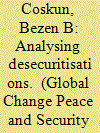

|
|
|
|
|
| Publication |
2008.
|
| Summary/Abstract |
Securitisation theory, which has been developed by a number of scholars affiliated to the Copenhagen Peace Research Institute, has become one of the most attractive analytical tools in contemporary critical security studies. The work of Barry Buzan, Ole waever and others has made a major contribution to our understanding of the dynamics of security by introducing the concepts of 'securitisation' and 'desecuritisation'. However, while this approach has made a major theoretical contribution in general, there have been few attempts at applying the concept of desecuritisation in particular. Moreover, at the theoretical level, there are also problems, notably an under-theorisation of the desecuritisation. This article is an attempt to apply the under-employed/under-theorised concept of desecuritisation to the Israeli-Palestinian case with a particular focus on the potential for desecuritisation arising from Israeli-Palestinian cooperation/coexistence efforts. Based on a conceptual framework that integrates desecuritisation with the concepts of peace-building and peace-making, the article pays attention to peace education efforts involving Israeli and Palestinian civil societies as desecuritisation initiatives.
|
|
|
|
|
|
|
|
|
|
|
|
|
|
|
|
| 2 |
ID:
085676
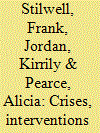

|
|
|
|
|
| Publication |
2008.
|
| Summary/Abstract |
Crises and interventions often generate opportunities for profitable business activities. This can have a significant effect on the outcomes of interventions. This article explores how economic interests can create crises and how the nature of interventions may be shaped by business interests. It looks further at the macroeconomic consequences of crises, the possibilities of corruption and neo-imperialism. Reference is made to examples of crises and interventions that illustrate these political economic concerns.
|
|
|
|
|
|
|
|
|
|
|
|
|
|
|
|
| 3 |
ID:
085716
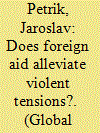

|
|
|
|
|
| Publication |
2008.
|
| Summary/Abstract |
Throughout most of its history, donors have perceived official development assistance (ODA) as a potentially helpful and mostly harmless form of intervention. Despite some destructive consequences, it was not until the late 1990s when the donor community realised that badly designed and insensitively implemented ODA can be just as disastrous to the recipient society as poorly executed military interventions or indiscriminate economic sanctions. Increasing interest in the impact of economic assistance on conflict made all major donor agencies adopt guidelines to avoid harming recipient societies and to maximise the positive impact of their aid on peace. This paper summarises the key literature on the role of ODA in ongoing conflicts as well as in times of peace, focusing on the influence of aid on violent tensions in the recipient societies. It traces the evolution of ideas which led to the recognition that aid can do harm. It argues that many of these connections, seemingly obvious, are unclear and likely to produce unmet expectations, and hence frustration.
|
|
|
|
|
|
|
|
|
|
|
|
|
|
|
|
| 4 |
ID:
085718


|
|
|
|
|
| Publication |
2008.
|
| Summary/Abstract |
Despite a growing awareness among scholars and policymakers of the role that gender plays in mobilising war crimes and human rights abuses and the need for attention to gender in the aftermath of violent conflicts, the international community has not yet paid sufficient attention to gender in the construction of mechanisms intended to promote justice in war-torn societies. Similarly, scholars have neglected gender as an explanatory concept in their analyses of efforts to promote 'post-conflict justice'. In an effort to address this void, this paper examines the limitations of prevailing approaches to justice in war-torn societies due to their failure to adequately consider the role of gender norms as a constraint on participation in the dominant mechanisms for pursuing 'post-conflict justice'. It also considers how mechanisms intended to promote justice in war-torn societies might be most appropriately constructed in an effort to bring justice to all victims of wartime violence.
|
|
|
|
|
|
|
|
|
|
|
|
|
|
|
|
| 5 |
ID:
085721
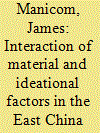

|
|
|
|
|
| Publication |
2008.
|
| Summary/Abstract |
This article seeks to explain the current phase of the East China Sea dispute between China and Japan. It argues that previous analyses privilege one aspect of the dispute over the other. Some stress the nationalist dimension of the dispute while others argue the primary motivations relate to the material wealth of the seabed combined with increased energy needs in China and Japan. By analysing the interaction between the nationalist (ideational) and resource (material) dimensions, it becomes clear why it has become increasingly difficult for policy elites in either state to seek compromise. This is because nationalist constituencies in China and Japan have extended their nationalist/ideational sentiment from the Senkaku/Diaoyu Islands to the entire East China Sea. Simultaneously, Beijing and Tokyo's interest in the material exploitation and security of the East China Sea has risen.
|
|
|
|
|
|
|
|
|
|
|
|
|
|
|
|
| 6 |
ID:
085715


|
|
|
|
|
| Publication |
2008.
|
| Summary/Abstract |
The field of media development, as an intervention in conflict-affected societies, is both growing, and divided. This article identifies and discusses some emerging divisions in the sub-field of journalist training. On the one hand is a 'modernisation' approach, geared towards the implantation of western-style precepts and methods for reporting conflicts. On the other is a critical pedagogical approach intended to enable participatory media development. In the latter, 'minority world journalism' is effectively problematised, especially around assumptions about the role of the journalist vis-a--vis conflict and whether it is proper, permissible and/or practically possible for editors and reporters to set out to contribute to peace. The contestation this divide has occasioned partly recapitulates the UNESCO media debate of the late 1970s and early 1980s. The concept of peace journalism is now attracting attention, both as a form of critical pedagogy in journalist training and as a potential rallying point for reviving calls for structural reform in the world information and communication
|
|
|
|
|
|
|
|
|
|
|
|
|
|
|
|
| 7 |
ID:
085678


|
|
|
|
|
| Publication |
2008.
|
| Summary/Abstract |
The extensive experience of the United Nations in peacekeeping and peacebuilding is beginning to reap rewards in terms of lessons learned and improved peacebuilding practice. Evolving peacebuilding theory and ideas about best practice to promote sustainable peacebuilding have been boosted by the creation of the UN Peacebuilding Commission (PBC). This paper reviews sustainable peacebuilding theory and the potential contribution of the PBC to addressing some of the challenges faced by non-UN interventions such as the Australian-led Regional Assistance Mission to the Solomon Islands (RAMSI), as well as the US-led interventions in Iraq and Afghanistan. We argue that the adoption by non-UN interventions of peacebuilding
|
|
|
|
|
|
|
|
|
|
|
|
|
|
|
|
| 8 |
ID:
085719
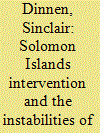

|
|
|
|
|
| Publication |
2008.
|
| Summary/Abstract |
Shortcomings in the prevailing discourse of 'failed states' and the practical challenges of international state-building are examined in this article through a detailed case study of the Solomon Islands, a small independent Pacific island country that since mid-2003 has been the subject of a substantial Australian-led regional state-building exercise. The Solomon Islands intervention and the difficulties it has encountered are examined in the larger context of that country's longer history of state-building and the particular challenges posed by its colonial legacies, the nature of its modern political development and the manner of its integration into the global economy
|
|
|
|
|
|
|
|
|
|
|
|
|
|
|
|
| 9 |
ID:
085720
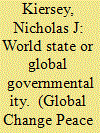

|
|
|
|
|
| Publication |
2008.
|
| Summary/Abstract |
Abstract This article addresses recent theoretical discussion about the state under conditions of globalisation, focusing in particular on recently popular 'world state' theory, as articulated by Martin Shaw and Alexander Wendt. It suggests that while world state theory is useful to the extent that it historicises the function of the state, it can be challenged for its uncritical approach to the question of how state power is actually constituted. To make this argument, the article refers first to an emerging Marxist critique that focuses on liberal hypocrisy and the role of imperial violence in the formation of the world state. However, while this approach reveals the elision of many forms of violence in world state theory, it shares world state theory's tendency to avoid exploring the role of more constitutive forms of power. Challenging this view, the article turns to Foucault's theory of governmentality and some recent applications of it to Imperialism, Empire, and the War on Terror.
|
|
|
|
|
|
|
|
|
|
|
|
|
|
|
|
|
|
|
|
|